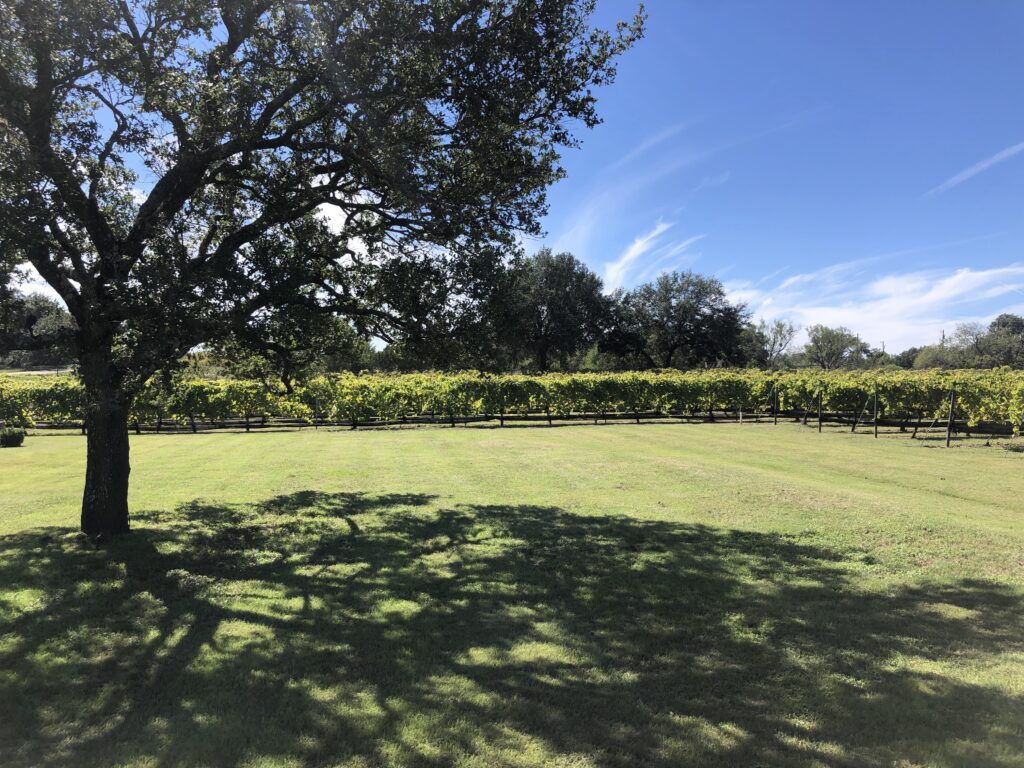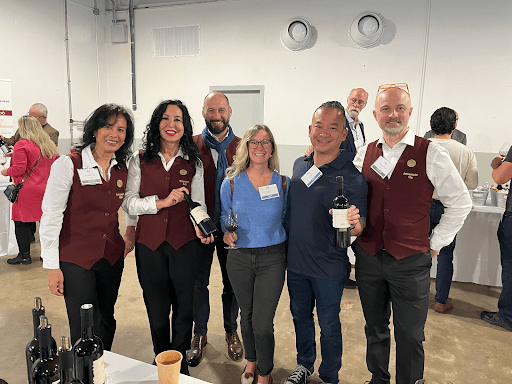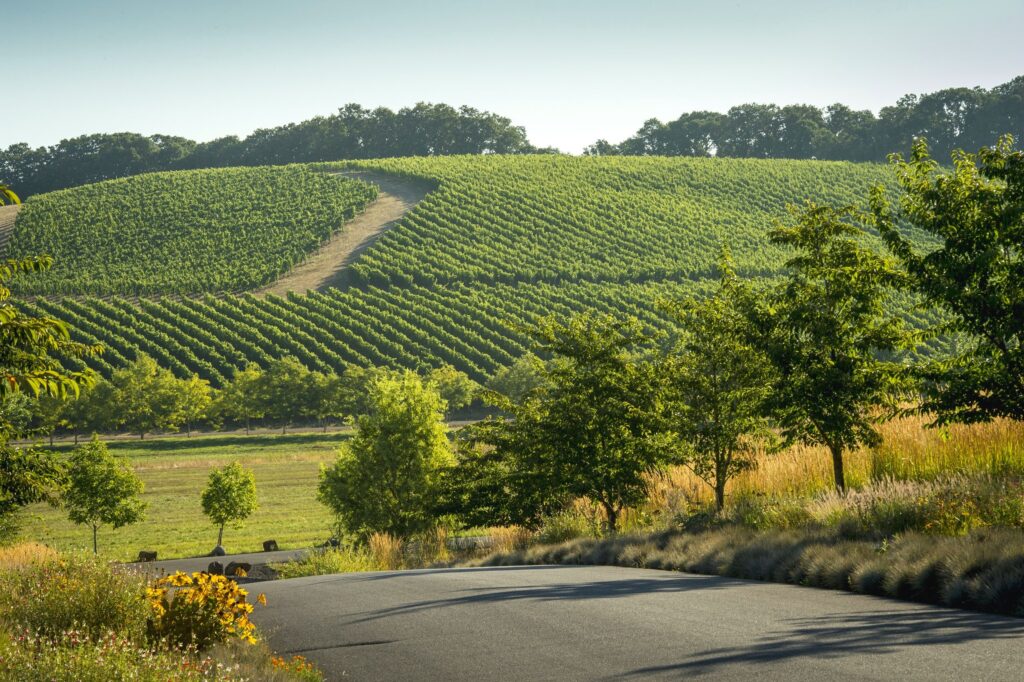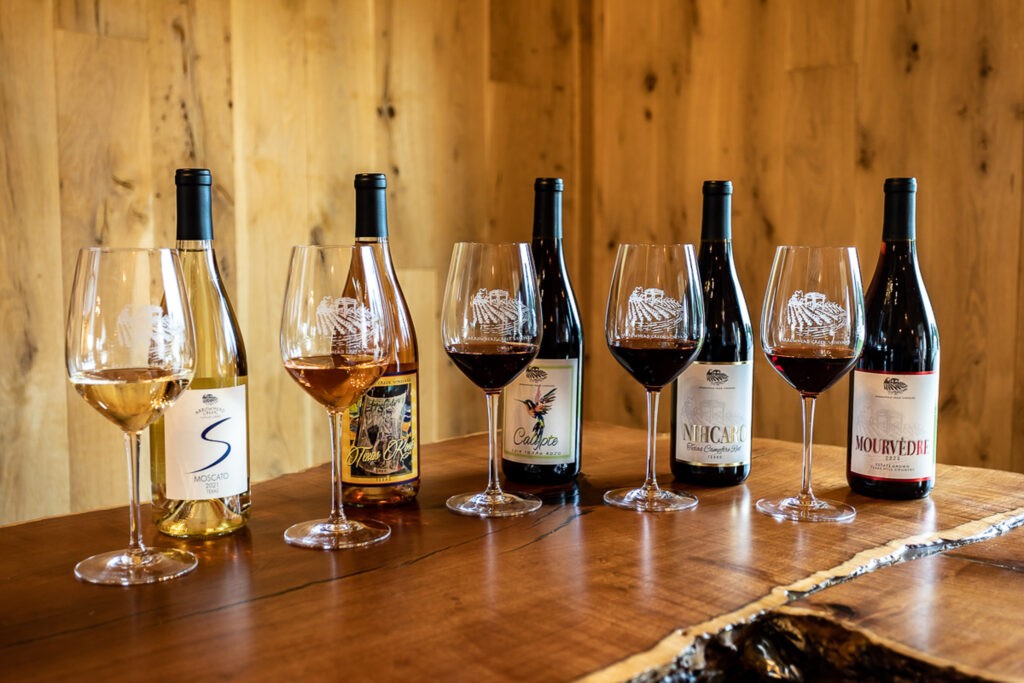A shameless plug for Texas wine, written by a Texan
Thanks for tuning in for Part II! My goal is to pick up where my last blog left off, and highlight some encouraging growth drivers for Texas’ wine industry.
Texas Sized Enablers
Below I’ve highlighted a few underlying conditions that I believe could accelerate the Texas wine industry’s sustainable growth, and allow it to thrive going forward. It’s worth noting that these enablers are not mutually exclusive, in that some naturally converge to boost Texas’ wine future based on its landscape, regulations, population, and the larger community.
The Soil
Agriculture Prowess
Texas is world renowned for the state’s agricultural prowess – in fact, Texas is ranked the fourth highest agricultural contributor in the country. Texans have historically produced cotton, corn, grains, rice, nuts, and more. Grape growers in Texas have learned that they can control the water much more effectively than cotton. In other words, once you have a cotton plant that only has a renewable growing season each year, you need to push water to it until fruition. With grapes, you can control that water and the grapes prefer the stress. You can have a hand in deciding when to stress that vine and when not. Although grape production is not going to replace cotton overnight, the higher value of grapes makes it an attractive crop in the Texas High Plains AVA. But what makes an AVA?
Agricultural Viticultural Areas (AVA)
An Agricultural Viticultural Area is a grape-growing region having distinguishing features, a name, and a delineated boundary. These designations allow vintners and consumers to attribute a given quality, reputation, or other characteristic of a wine made from grapes grown in an area to its geographic origin. The establishment of viticultural areas allows vintners to describe more accurately the origin of their wines to consumers and helps consumers to identify wines they may purchase.
Texas has eight AVAs although many vineyards exist outside the specified AVAs. For a wine to mention an AVA on the label, 85% of the volume of wine must come from grapes grown in that designated region. In addition to the main eight AVAs, there are also two sub-AVAs: Bell Mountain and Fredericksburg, both contained within the boundaries of the dominant Texas Hill Country AVA. The AVA label is starting to matter more to consumers as dedicated drinkers can come to identify wines with characteristics and grapes they are searching for.

Legislation
Direct-to-Consumer (DTC) Access
In 2005, Governor Rick Perry passed a law making direct to consumer sales possible. DTC sales are a major driver of profitable growth: for on-site consumption, on-premise sales, and shipping. Similarly, it’s a critical enabler for Wine Club Membership feasibility, which is often described by winery owners and operators as the “lifeblood of the business.”
Direct shipping laws for Texas wineries continue to be open-permit. As of Jan. 1 2019, the number of permittees shipping required to report shipments increased to over a thousand more, showing a growth in demand for Texas wines through the state’s approachability and success.
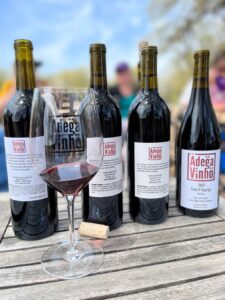
Business Friendliness
Texas is notorious for being business friendly. With low business operating costs, no state income tax, and an internationally ranked economy, Texas is very attractive for small and large businesses alike. And recently in March 2022, Texas was awarded the Governor’s Cup as the top-performing state for job creation and capital investment, for the 9th year in a row.
The Texas Consumer
State Demographics
Like mentioned in part I, Texans drink a lot of wine. As of late 2021, the state population of Texas has eclipsed 29 million residents, and Texas consumers drank 60.3 million gallons of wine by volume. According to the wine map of states, Texas stands with California, Florida, and New York as the only four states to drink over 40 million gallons of wine by volume.
Texas Pride
What does it even mean to be Certified 100% Texas Grown? After years worth of discussions among Texas wine growers regarding how to identify wines that are made from 100% Texas grapes, the official Texas Wine and Grape Growers finally passed The 100% Texas Grown Emblem program. Big shoutout to Chris Brundrett of William Chris Vineyards for leading the charge on this initiative. 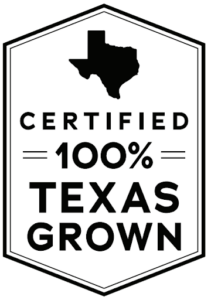
The membership and official mark of certification requires that the participants’ wine is made from grapes grown entirely (100%) within the state of Texas (with the exception of high proof spirits used for fortification and concentrate used as an addition). Using this bold emblem stands out from other wines as both a marketing tactic and a statement of pride.
Texas Wines, Texas Bold is a recent marketing campaign to increase consumer awareness and consumption of Texas wine. The campaign consists of fun narratives and videos that express Texas spirit. The campaign outlines objectives such as highlighting the vineyard harvest and the wine process. By promoting their brand and the Texas wWine industry via social media channels, emails, wine clubs, websites, and even tasting rooms, Texas wineries can showoff their pride as a Texan and a winemaker.
The Digital Consumer
Internationally, digital customers of wine have grown dramatically, a trend accelerated by the coronavirus pandemic, which drove omni-channel offerings to expand. According to a press release by IWSR drinks and market analysis published in December 2020, the US had a strong potential to surpass China as the leading e-commerce alcohol market; they forecasted growth of the DTC channel to $3 billion by 2024.
Well, that was a conservative number compared to the actual DTC number in 2021, which exceeded $4 billion! In fact, the market projects sustained DTC online buying, a reevaluation of shipping regulations to increase convenience, larger consumer outreach, and a shift in target audience.
Whereas winemakers traditionally market to the older population, harder-to-reach younger generations have started to grow the DTC consumer base. Gen Y and Z consumers have different wants, needs, and evaluation of competitors compared to previous generations.
By the Numbers
Texas’ wine industry has been growing for years. Texas added 686 bonded wineries between 1999 and 2019. Texas’ production operations now stand as the fourth ranked in the US, based on the total number of bonded wine-making facilities.
According to a five-year-old study, the Texas Wine industry contributed $13.1 billion to the economy (2017). In 2018, according to the United States Department of Agriculture, Texas’ bearing acres devoted to grapes increased to a total of 5,140 acres. It’s worth noting that growth has accelerated in the years since it was conducted.
Overall, based on the National Association of American Wineries, the Texas wine industry:
- Contributes more than $13.1 Billion of Economic Value to the State of Texas
- 104,267 full time jobs paying $4.3B in wages
- 1.7M+ visits to Texas wineries and tasting rooms
- Tourists spend $716 Billion annually
- 700+ Wineries (permits issued by TABC as of 2022)
- Vineyard Acreage: 4,368
These numbers can be challenging to process out of context, so we can also look to aspects such as community to better and more directly monitor the trends.
The Community
Academic Programs
Educational and professional opportunities for the Texas’ wine industry continue to grow. For example, University of Texas at Austin’s Wine Initiative (UTWI), a donation based program, was established in March 2021 to support undergraduate research studies in the field of wine and viticulture education. This mutual partnership between the Texas wine industry and UT students fosters knowledge and support in the development of innovative strategy, agriculture, and the reputation of Texas grapevines.
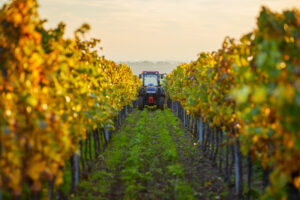
Texas A&M University’s Agriculture and Life Sciences school offers an Enology certificate providing students the opportunity to advance their wine career and gain a deeper knowledge of wine. This rigorous course encapsulates the science behind the fermentation process, sensory evaluation, and history behind wine culture. The University continues to promote the education of wine through graduate-level internships that seek to “improve Texas wine quality and serve to enhance the competitiveness and longevity of grape production in the state” according to the program’s literature.
Texas Tech’s Department of Plant and Soil Sciences offers graduate, undergraduate and professional-level courses about viticulture. The Viticulture and Enology program within the college created “The Vineyard Advisor” mobile app to guide consumers through the problems afflicting grapes and the determinants of traditional cash crop irrigation.
Grayson College offers a Viticulture and Enology program, with most courses offered as a hybrid combination of Internet and weekend classroom instruction. This accommodates students who cannot commit to traditional weekday classes without sacrificing hands-on learning. The Viticulture and Enology Program maintains a 3-acre vineyard, an extensive wine laboratory, and an instructional winery, about an hour drive from DFW.
Respected winemaker Bénédicte Rhyne teaches hands-on vineyard management and winemaking courses in Central Texas, near Fredericksburg. She has an onsite winemaking lab, and her courses range from, “Fantastic Voyage Through the Science of Wine” and “ Voyage to the Center of Terroirs” to a four-day immersive program which I cannot wait to take someday, covering the cycle end to end.
By creating accessible and educational viticulture opportunities for the next generation, Texas programs allow the wine industry to expand and improve relationships with all stakeholders.
Trade Orgs & Partnerships
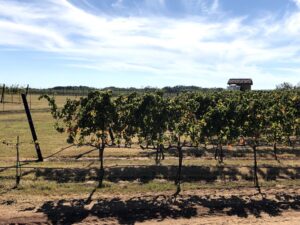
The growth of the Texas wine industry has extended to multiple types of business entities, campaigns, and partners. Every year, Texas Wine and Grape Association hosts trade shows and conferences to help advance the industry, grow businesses, and build networks. They even host a Lone Star International Wine competition where winning wines get bragging rights and internationally recognized press as a commercial winery. The Association professional attracts speakers to attend the annual Newsom Grape Day to further educate growers and help them differentiate themselves in the market.
Uncork Texas helps direct wine traffic into the local community by promoting wineries and grape growers across the state with the mission to create, or rather “uncork” memories around the Texas wine experience.
Further evidence that Texas has been drawing attention in the wine scene, Vinum55, an Arizona based speciality wine concierge service, recently expanded into Texas territory, as Texas became the fourth Vinum 55 storage location in the U.S. They came to Texas primarily for the Dallas wine market and found a perfect location that would draw in source and transport their products easily. The business also hopes to reach its membership-based club model and wine logistics throughout Texas and southeastern U.S. in the coming years.
ATX Somms is a public service organization committed to education and mentorship for beverage industry professionals in Austin, and is affiliated with the Texas Wine School. According to the website, this group connects the community to resources, events, and opportunities and is for all passionate professionals seeking knowledge. They provide monthly blind tasting practice and educational events presented by experts. ATX Somms will also serve as a network for individuals seeking certification preparation support of any kind.
Awards & Recognition
Texas grape growers have worked to learn which varieties do well in Texas climate and soil. Texans are proud to share their award-winning Texas wines made with Texas grapes.
With hard work comes reward. Llano Estacado, the second oldest currently operating winery in Texas, was an early winner in the revered San Francisco Fair competition in 1986, taking a Double Gold for its 1984 Chardonnay. Soon afterward, in 1988, Llano Estacado took home a Gold at an international competition for its 1985 Cellar Select Cabernet Sauvignon along with other notable awards, putting Texas on the map. Many others have since been awarded medals for standout wines, both domestically and internationally. For example, Kuhlman Cellars is a recipient of multiple international accolades, including five medals in 2020 at Concours de Lyons. Quoted by the linked Forbes article, “This is very exciting for us,” says Kuhlman Cellars owner Chris Cobb. “Many of our grapes are French in origin. To win gold with Texas wines in the grapes’ ancestral homeland is an honor.”
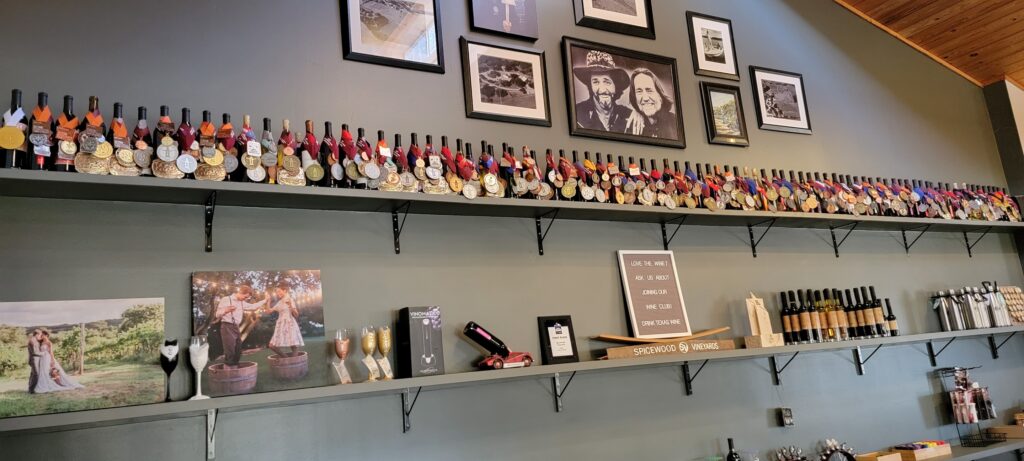
At the time of this writing, 2022 San Francisco Chronicle awards were recently announced, and Texas wines took home 338 medals across all categories! And, at the Texas International Wine Competition in late 2021, Texas wineries won 287 medals.
In 2021, 2,400 wines from around the world were blindly judged at San Francisco Chronicle wine competition, Texas wineries took 1814 medals and 186 awards. And TEXSOM International Wine Awards of 2021 granted two Judge Selection Medals to Texas Hill Country wineries, the highest esteemed award at the event.
Texas wineries have been recognized for not only the quality of the product and service, but also for embracing innovation.
Business Model Innovation
Texas wineries made a splash in Forbes magazine due to their innovative response to the Texas freeze. Grape growers saw this weather obstacle as an opportunity to create a whole new innovative strategy to save their vineyards. Specifically, Reddy Vineyards, located in Brownfield Texas, developed “The Circle Vineyard” method by observing the sun’s exposure patterns to create a minimalist approach to planting and winemaking.
Kerrville Hills Winery announced in 2021 that they would use a Flash Détente system for grape extraction. The benefits of this advanced incubation program increases the efficiency of the fermentation process and results in denser flavors and colors of the grapes. In other terms, it creates an enhanced experience to taste and observe the natural qualities of the grapes from the vineyard.
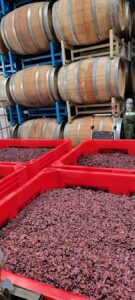
Other Texas wineries are doing their part to provide more opportunities to small wine producers. For example, Slate Mill Collective, The Austin Winery, and Kerrville Hills use their full-service incubator to improve wine production and brand awareness in Texas. These programs allow their collaborators to be as involved as they choose in using the company’s space, equipment, winemaking, and legal help.
Custom crush facilities support the idea by sharing their knowledge, resources and equipment to help the success and sustainability of their community. Collaboration reduces the amount of capital needed to thrive in a high cost industry to maintain, and has been successful in other regions such as France and Sonoma.
Many wineries such as Signor Vineyards and Calais Winery leverage Wine Club Memberships and Allocation lists respectively, to plan for and produce the highest quality wine with confidence in the market demand for future seasons, benefitting from the better margins selling direct-to-consumer (DTC).
Stonewall’s WineCub supports many Texas wineries with storage, shipping and compliance services, and recently opened up a tasting room onsite, called The Den, where they host events in partnership with winemakers and other local businesses.
Some wineries, such as Wine for the People, C.L. Butaud, Adega Vinho, and Turtle Creek, have leaned into a more event-based approach, offering exclusive and unique dinner pairing experiences in partnership with local chefs and restaurants. And many wineries successfully embraced a virtual event experience to stay engaged with customers, during 2020-2021. New events are constantly added, so we recommend subscribing to your favorite wineries’ newsletters for the latest updates!

And of course, Sommly’s goal is to increase discoverability for Texas wineries, of all sizes, and to democratize access to eCommerce capabilities with the introduction of a digital marketplace for wine. Increasing discoverability encourages consumers beyond the state’s borders to visit Texas’ beautiful vineyards for themselves.
Tourism
In August of 2021 USA Today named Texas Hill Country #3 in the top ten Wine Regions in North America, up from #5 the year prior. “The Hill Country is such a special place to us all and we are thrilled to share it with the world thanks to all of the Texas wine lovers who voted for the region this year,” said January Wiese, Executive Director of Texas Hill Country Wineries (THCW), in the linked article published by Vintage Texas.
The Texas Hill Country’s wine tourism numbers are second in the U.S. only to Napa Valley, according to The American Way. And it’s worth noting that the Texas Hill Country has a symbiotic relationship with the Texas High Plains, where over 80% of wine grapes are grown. While more and more vines are being planted across the state, the Texas High Plains are still by and large the primary source of Texas fruit, although there are few tasting rooms in that region.
According to a recent study, 32% of tourists visiting Fredericksburg list wine as their top reason for travel, up from only 11% in 2000. Hospitality, related services and pastimes, transportation, and the natural beauty of the Texas landscape contribute to the tourism draw, as especially the Hill Country has seen immense investment over recent years, as the density of wineries (especially along the 290 corridor connecting Austin and Fredericksburg) has increased notably.
Tourists are attracted to vineyard visits and overnight stays, especially with expanding kid friendly tasting rooms and vineyards. 2021 rebounded in hotel demand over spring break of 2021, an increase from the pandemic at 71.6%. Tourists are learning that the Lone Star State has more to offer than just rodeos and tacos. As great as those are, people have been drawn to the natural scenery and beauty of Texas’ vineyards. The Texas Hill Country provides sights of grazing cattle, oak forests, canyons, wildflowers, and historic towns among the rolling hills. Fredericksburg, the heart of the Texas Hill Country, provides tours and shuttles to tasting rooms. Texas wine country is scenic year-round, but everyone should be sure to check it out during the fall grape harvests!

In the Hill Country today, there’s something for everyone. Increasingly, Texas is seeing wine tourism expand to a more sophisticated consumer who appreciates education, food pairings, and overall more interactive and open-minded experiences with wine tasting. Texas producers have grown their expertise in viticulture and wine making. Growers have seen success choosing the right varietals and yield for their terroir and climate in Texas AVAs. It is essential to build this community of growers, drinkers, and educators to build a culture and commitment to wine.
Building a Texas Wine Centric Culture
Through educational programs, accolades, and partnerships, Texas grape growers, winemakers, and industry organizations are getting better at educating consumers about the reality of the industry here in Texas today. To quote one of my favorite local winemakers Rae Wilson of Wine for the People, “We need to build a culture in wine, educate people that they live in an emerging wine region. The more we connect consumers to the place they’re living and they understand this is part of what happens here, the more we’ll find that support and interest will continue to grow because of that connection.”
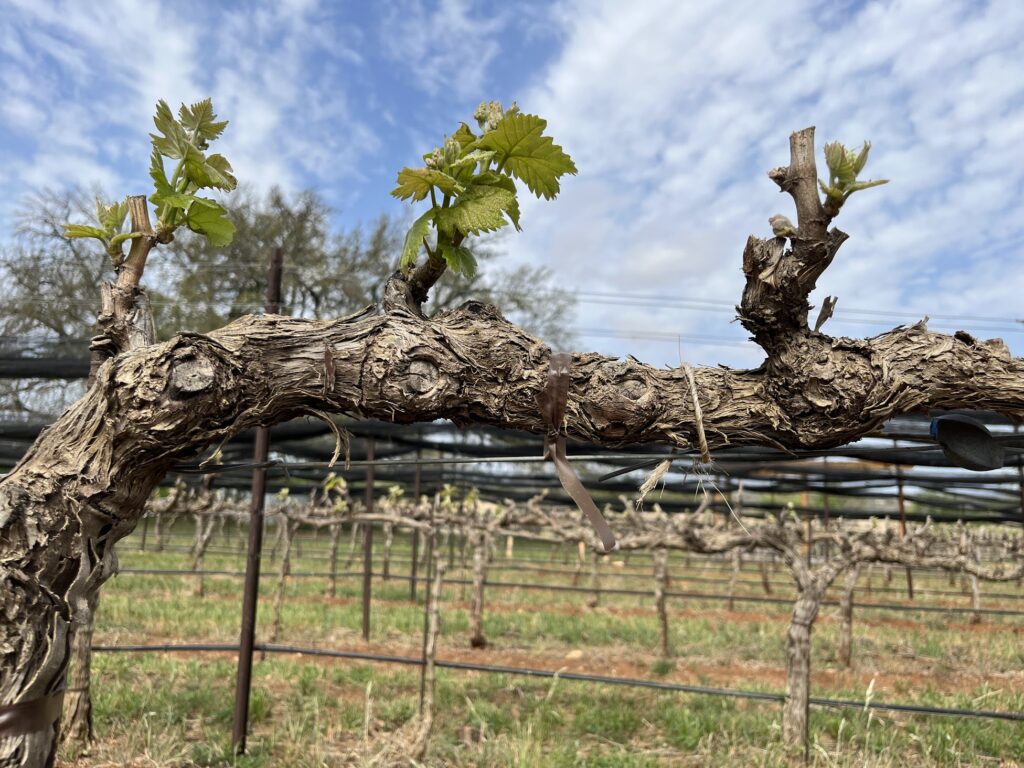
I’ve seen winemakers and consumers alike start to celebrate the seasons and culture of wine more and more over the last few years. For example, making vineyard events like harvest available for consumers to participate in, and sharing weather updates, bud break, and bottling day stories on social media.
I hope and believe that Texans will choose to buy more wine produced within the state, given the quality of Texas wine is seemingly better everyday, not to mention the business and environmental benefits of buying local.“The quality of wines from Texas is world-class, and it’s great that the Texas Hill Country Wineries are continuing to be recognized on the global stage… From whites to rosés to reds, Texas wineries are producing a breadth of unique, award-winning wines that are ready to be discovered.” January Wiese, Executive Director, Texas Hill Country Wineries, said it best when recently quoted by the Wine Industry Advisor,

